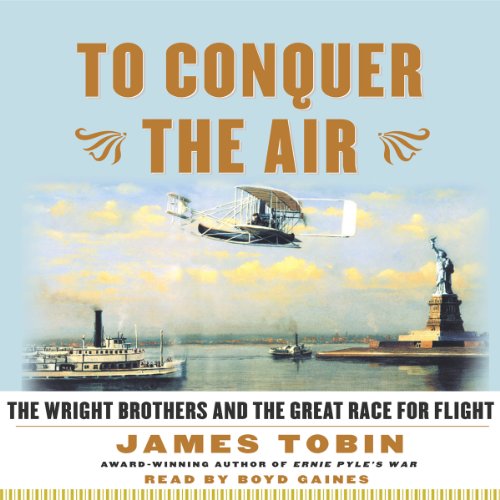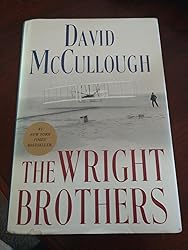
 Audible sample
Audible sample  Playing...
Playing... 
 Paused
Paused  Your audiobook is waiting!
Your audiobook is waiting!
Enjoy a free trial on us
$0.00$0.00
- Click above for unlimited listening to select audiobooks, Audible Originals, and podcasts.
- One credit a month to pick any title from our entire premium selection — yours to keep (you'll use your first credit now).
- You will get an email reminder before your trial ends.
- $14.95$14.95 a month after 30 days. Cancel online anytime.
Buy
-13% $17.05$17.05
The Wright Brothers
 Audible Audiobook
– Unabridged
Audible Audiobook
– Unabridged
Two-time winner of the Pulitzer Prize David McCullough tells the dramatic story behind the story about the courageous brothers who taught the world how to fly: Wilbur and Orville Wright.
On December 17, 1903, at Kitty Hawk, North Carolina, Wilbur and Orville Wright's Wright Flyer became the first powered, heavier-than-air machine to achieve controlled, sustained flight with a pilot aboard. The Age of Flight had begun. How did they do it? And why? David McCullough tells the extraordinary and truly American story of the two brothers who changed the world.
Sons of an itinerant preacher and a mother who died young, Wilbur and Orville Wright grew up on a small sidestreet in Dayton, Ohio, in a house that lacked indoor plumbing and electricity but was filled with books and a love of learning. The brothers ran a bicycle shop that allowed them to earn enough money to pursue their mission in life: flight. In the 1890s flying was beginning to advance beyond the glider stage, but there were major technical challenges the Wrights were determined to solve. They traveled to North Carolina's remote Outer Banks to test their plane because there they found three indispensable conditions: constant winds, soft surfaces for landings, and privacy.
Flying was exceedingly dangerous; the Wrights risked their lives every time they flew in the years that followed. Orville nearly died in a crash in 1908 but was nursed back to health by his sister, Katharine - an unsung and important part of the brothers' success and of McCullough's book. Despite their achievement the Wrights could not convince the US government to take an interest in their plane until after they demonstrated its success in France, where the government instantly understood the importance of their achievement. Now, in this revelatory book, master historian David McCullough draws on nearly 1,000 letters of family correspondence plus diaries, notebooks, and family scrapbooks in the Library of Congress to tell the full story of the Wright brothers and their heroic achievement.
- Listening Length10 hours and 2 minutes
- Audible release dateMay 5, 2015
- LanguageEnglish
- ASINB00TA5MPEU
- VersionUnabridged
- Program TypeAudiobook
 Read & Listen
Read & Listen
Get the Audible audiobook for the reduced price of $8.99 after you buy the Kindle book.
People who viewed this also viewed
- Audible Audiobook
- Audible Audiobook
- Audible Audiobook
- Audible Audiobook
- Audible Audiobook
People who bought this also bought
- Audible Audiobook
- Audible Audiobook
- Audible Audiobook
- Audible Audiobook
- Audible Audiobook
Related to this topic
- Audible Audiobook
- Audible Audiobook
- Audible Audiobook
- The Flight of the Century: Charles Lindbergh and the Rise of American Aviation: Oxford University Press: Pivotal Moments in US History
 Audible Audiobook
Audible Audiobook - Audible Audiobook
Product details
| Listening Length | 10 hours and 2 minutes |
|---|---|
| Author | David McCullough |
| Narrator | David McCullough |
| Whispersync for Voice | Ready |
| Audible.com Release Date | May 05, 2015 |
| Publisher | Simon & Schuster Audio |
| Program Type | Audiobook |
| Version | Unabridged |
| Language | English |
| ASIN | B00TA5MPEU |
| Best Sellers Rank | #4,413 in Audible Books & Originals (See Top 100 in Audible Books & Originals) #1 in Aviation Engineering #12 in Biographies of Science & Technology Leaders #29 in Historical Biographies (Audible Books & Originals) |
Customer reviews
Customer Reviews, including Product Star Ratings help customers to learn more about the product and decide whether it is the right product for them.
To calculate the overall star rating and percentage breakdown by star, we don’t use a simple average. Instead, our system considers things like how recent a review is and if the reviewer bought the item on Amazon. It also analyzed reviews to verify trustworthiness.
Learn more how customers reviews work on AmazonReviews with images
-
Top reviews
Top reviews from the United States
There was a problem filtering reviews right now. Please try again later.
This book is absolutely inspiring in its writing and content, everyone should read this book.
FAMILY
McCullough makes it clear that the Wilbur and Orville were a product of their family environment. Their father was the major influence. Milton Wright was a minister and finally a bishop in the United Brethren Church in Christ.
McCullough writes — “He was an unyielding abstainer, which was rare on the frontier, a man of rectitude and purpose— all of which could have served as a description of Milton himself and Wilbur and Orville as well.”
His strict values molded and focused the views of the three younger Wrights (Katherine, Wilbur, and Orville). In addition to his strictness, he was a true classical liberal in his beliefs in the scientific method and equal rights for all people, no matter their race or gender. For example, Milton wrote to his sons when they were in Paris trying to get support for their flying machine: “Sons—Be men of the highest types personally, mentally, morally, and spiritually. Be clean, temperate, sober minded, and great souled.” As grown, experienced, and highly successful inventors, they responded: “Father — All the wine I have tasted since leaving home would not fill a single wine glass. I am sure that Orville and myself will do nothing that will disgrace the training we received from you and Mother.”
McCullough writes — “Years later, a friend told Orville that he and his brother would always stand as an example of how far Americans with no special advantages could advance in the world. ‘But it isn’t true,’ Orville responded emphatically, ‘to say we had no special advantages . . . the greatest thing in our favor was growing up in a family where there was always much encouragement to intellectual curiosity.’ ”
BUSINESS
McCullough records Wilbur’s thoughts on being in business in a letter to his brother Lorin in 1894:
“In business it is the aggressive man, who continually has his eye on his own interest, who succeeds. … There is nothing reprehensible in an aggressive disposition, so long as it is not carried to excess, for such men make the world and its affairs move. . . . I entirely agree that the boys of the Wright family are all lacking in determination and push. That is the very reason that none of us have been or will be more than ordinary businessmen. … We ought not to have been businessmen.”
In 1911, Wilbur wrote:
“When we think what we might have accomplished if we had been able to devote this time [fighting patent infringement suits] to experiments, we feel very sad, but it is always easier to deal with things than with men, and no one can direct his life entirely as he would choose.”
The Wrights never built, or even tried to build, an industrial empire as Ford or Edison or their Dayton neighbors John and Frank Patterson (National Cash Register) had done. The Wrights were intellectual men and women.
ENGINEERING
McCullough's book is quite light on technical discussions. But the Wrights' unique approach to technology development is the essence of who they were and why they were such successful engineers when others better funded, better educated, and better connected failed. For example, McCullough ignored the following examples.
Wilbur and Orville were superb engineers, though neither went beyond high school. They found by trial and error that the existing data held by the science of aeronautics was flawed even though its principles were generally correct. They zeroed in on weight, power, control, lift, and the propeller as the main technologies that had to be solved. What is so astounding is not just that they solved these technical problems and reduced them to practice, but that they did it in record time. In a matter of three years, they invented or reinvented virtually the whole field of aeronautics. For example, the wind tunnel had been invented thirty years before, but Wilbur and Orville developed it into a precise quantitative instrument. With it, they developed not just the wing configurations, but coupled with the understanding that a propeller is simply a wing on a rotating shaft, they rewrote the rules of propeller design and optimized its efficiency dramatically. These two men had an insight into, and a reverence for, quantitative empirical data that was unique in aeronautical engineering at that time.
McCullough shows how that reverence for truth (data) grew out of their family standards. But there was more to it than the principles of a strict Protestant upbringing. It also has to do with time and place. The late 1800s and early 1900s was a period of great minds applying the rules of The Enlightenment and the experience of science to practical problems. The place was an industrial axis, which was anchored by Dayton and Detroit and included Flint, Toledo, Cleveland, Pittsburgh, Cincinnati, and many other cities in the Midwest. This is where Edison, Ford, Dow, Firestone, the Patterson Brothers, and the Wright Brothers lived and created their technologies. There was a culture of boundless innovation and an infrastructure that included materials and support equipment that fostered great invention. It was similar in many ways to Silicon Valley today.
REINFORCE THE NARRATIVE
Another area that could be strengthened in the book is its niche. There has been so much written about the Wrights that each new book needs to distinguish itself in some way with a different point of view, a new set of facts, or a fresh interpretation of old facts.
For example, McCullough writes — “In early 1889, while still in high school, Orville started his own print shop in the carriage shed behind the house, and apparently with no objections from the Bishop. Interested in printing for some while, Orville had worked for two summers as an apprentice at a local print shop. He designed and built his own press using a discarded tombstone, a buggy spring, and scrap metal.”
That last sentence about building his own printing press defines so much about Orville and his simple pragmatism. To reinforce that point requires some expansion of that event or similar other defining events in the lives of Wilbur and Orville. I wanted to read more about Orville's compulsive act of invention, but it wasn't there.
The 81 photos McCullough includes in his book are treasures. Many of them are familiar, but so many are new looks at the Wrights. I wish there were greatly expanded captions below each photo, for each one is a story in itself.
One source of knowledge about the Wrights’ approach to aeronautics is the Air Force Museum at Wright-Patterson Air Force Base in Dayton. It is normally overshadowed by the more popular Air and Space Museum in Washington, but the exhibits at the Air Force Museum walk you through the Wrights’ engineering exploits with a degree of detail and insight I have found nowhere else.
You can easily see that if flight had not come about, not only would all our lives have been different, some of us might never have been!
David McCullough has brought us a wonderful popular history, a survey, of the Wright Brothers and their bringing flight to the world. Yes, others are still put forward as having beaten them to the air, but as one of their early rivals noted, no one seemed to be able to fly until Wilbur showed them how then everyone could do it. All the other claimants are for getting off the ground for a bit, but not for controlled flight as the Wright Brothers accomplished.
This book covers their early life through their ten years of inventing flight, their 1903 flight at Kitty Hawk, their flights at Huffman Prairie, their 1908 paper, the work Orville did with contracts to the U.S. Government and Wilbur’s work and exhibitions in France. Yes, there were rivalries, jealousies, claims for credit. But the reality in the final analysis is that Wilbur and Orville did this great thing with their high school educations and completely financed it themselves without any outside money from wealthy folks or the government.
The book is an entertaining and informative read with lots of photos. But if you get interested in the subject you can supplement this book with lots of fabulous information on the web and videos done about the Wright Brothers by people who actually knew them!
Wilbur died far too young and Orville lived through WWII and saddened to see their great gift to the world become the means of delivering death and horror in war.
Still, my life has been blessed by flight. Last year I took my four year old granddaughter, Amelia, to the Ann Arbor City Airport and we watched planes land and take off as I explained flight to her. She was fascinated. She charmed a very nice man who was the pilot of a Lear Jet that was getting ready to leave in a few hours. He invited her to wander around the inside of the jet to see how it looked inside. She was DELIGHTED. I was so happy to see flight beginning to bless her life and pique her curiosity, too! I bought her a model of the Wright Flyer and gave it to her Dad so they could build it together. They did and it is proudly in her room.
A great thing. And we owe it to Wilbur and Orville and what they began back in December 1903 at Kitty Hawk, North Carolina!
Reviewed by Craig Matteson, Saline, MI
Top reviews from other countries
Two things surprised me, though. One was the anti-semitism that their sister expressed when hearing of Hart Berg, the reprentative of Flint and Company, who would eventually reprensent them, and two, was their fates in the end. Somehow both these elements seemed out of character. The Wright Brothers, themselves, were peculiar, however. It seems neither ever had as much as a girlfriend, at least from the story McCullough tells, and one has to wonder why that was. They lived at home their entire lives, along with their sister, who likewise seems to have avoided the opposite sex for most of her life. McCullough doesn't dwell on this, but it does seem a bit strange. But I suppose genius is often found in madness.
But it's a truly fascinating, incredibly American tale, and well worth a read.






























